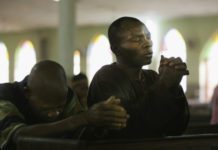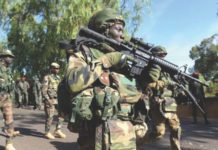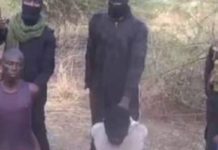BosNewsLife Africa Service
ASMARA, ERITREA (BosNewsLife)–Christians in Eritrea’s capital Asmara remained concerned Thursday, May 1, over the plight of five fellow believers after they were detained while training to be pastors in the capital Asmara.
While the detention of believers is not uncommon in Eritrea, rights activists called the case unique as these Christians belong to the Lutheran church — one of four legally recognized religious communities in the country.
The other three “legal” groups are the Orthodox Church, the Roman Catholic Church and Sunni Islam community.
Petros Yosief, Bemnet Tesfay, Aklilu Tesfay, Ermias Hadgu and Aron Mehretu were detained at a police station shortly after their church announced on April 20 that the five would be ordained, Christians said.
GROWING PRESSURE
“This arrest clearly shows that even officially sanctioned churches are not immune from government interference,” a Christian said, speaking on condition of anonymity, in published renarks.
“The arrest of these pastoral candidates reminds us of one of the greatest challenges the churches in Eritrea face. Due to the arrest or threats against pastors, continuous and Biblically consistent pastoral care for Christians is hampered,” another believer was quoted as saying.
Voice Of the Martyrs Canada (VOMC), a major advocacy group investigating the case, told BosNewsLife that it had urged its supporters to pray for the five detained believers and to also remember the “thousands of other believers who are currently languishing in prisons in Eritrea,” including in military prison camps and containers.
ENCOURAGEMENT URGED
“Ask that they be encouraged to continue looking to the Lord for perseverance, grace and their anticipated release,” VOMC added. It comes amid international pressure on Eritrea’s President Isaias Afewerki to introduce more religious and democratic freedom in the African nation.
He was elected president of independent Eritrea by the national assembly in 1993, after already serving as the de facto leader before independence.
Presidential elections, planned for 1997, never materialised and Eritrea has remained a one-party state, with the ruling People’s Front for Democracy and Justice the only party allowed to operate.
Afewerki, who was criticised for failing to implement democratic reforms, denied wrongdoing. He said a crackdown on certain Christian churches was needed as several religious groups “are duped by foreigners”, seeking to “distract from the unity of the Eritrean people and distort the true meaning of religion.”
His government has also clamped down on its critics and closed the private press, according to Western observers.








